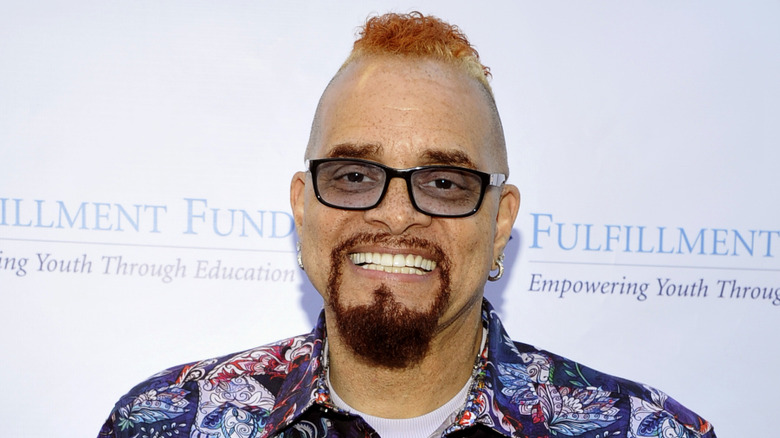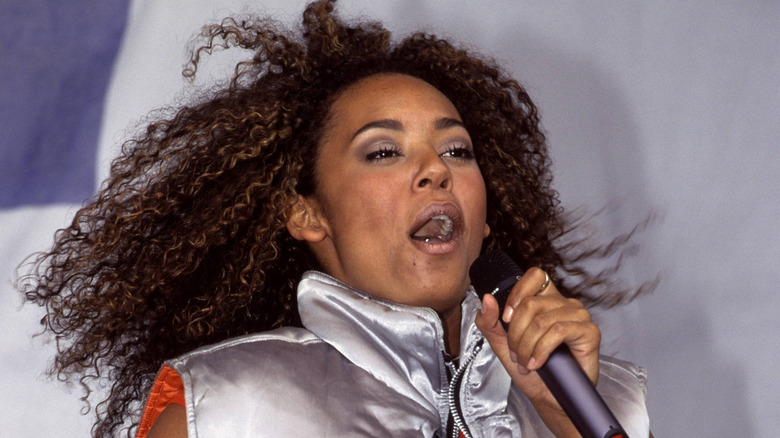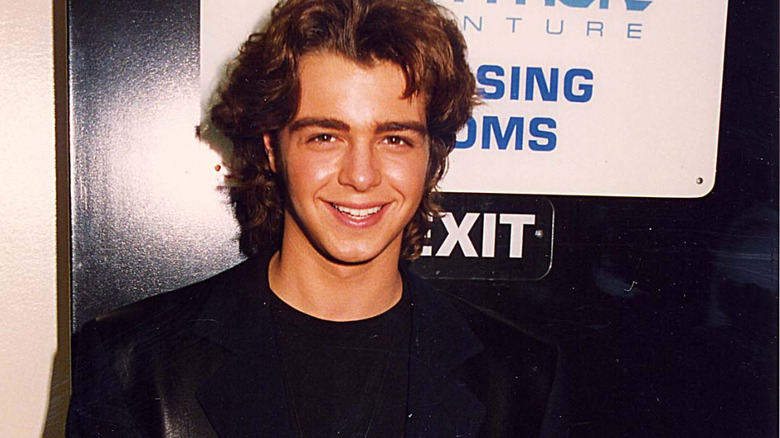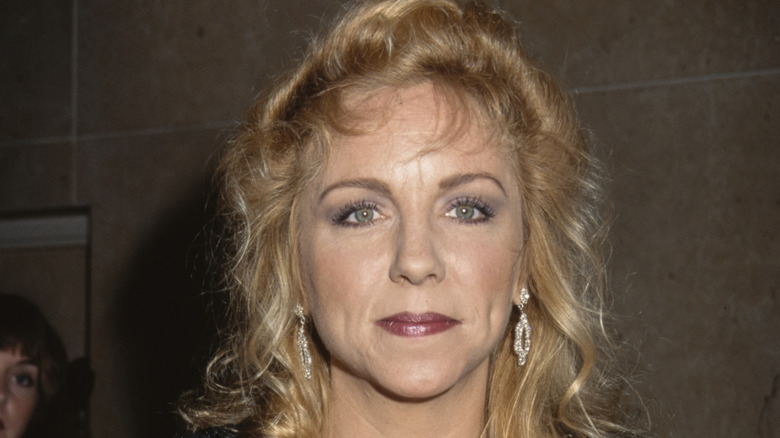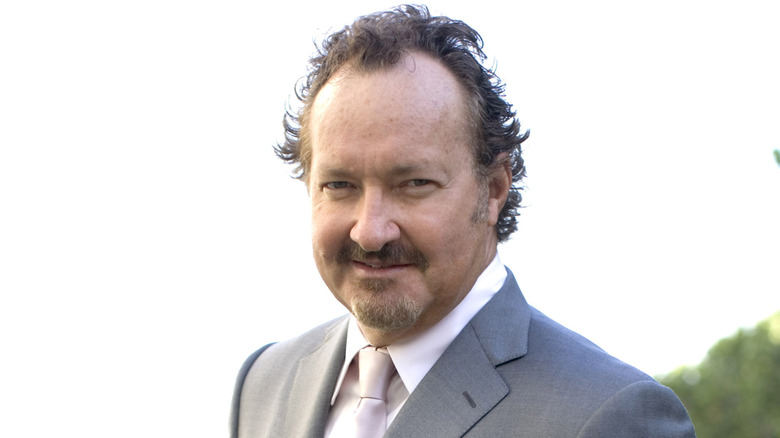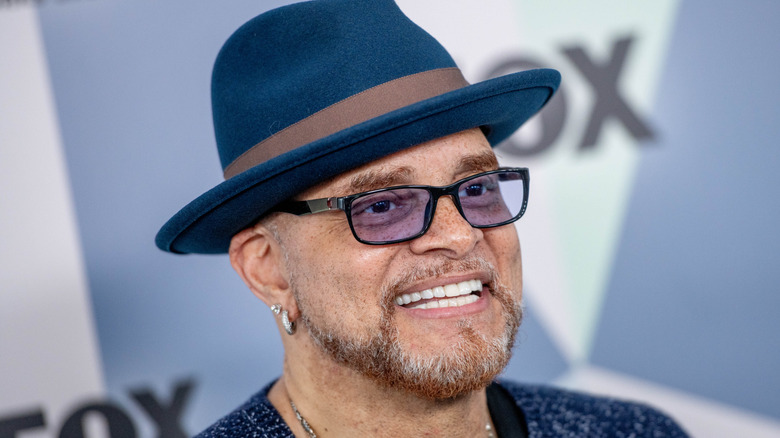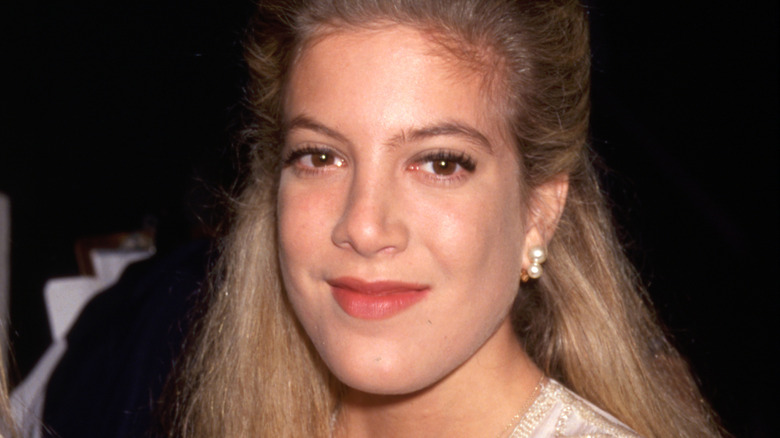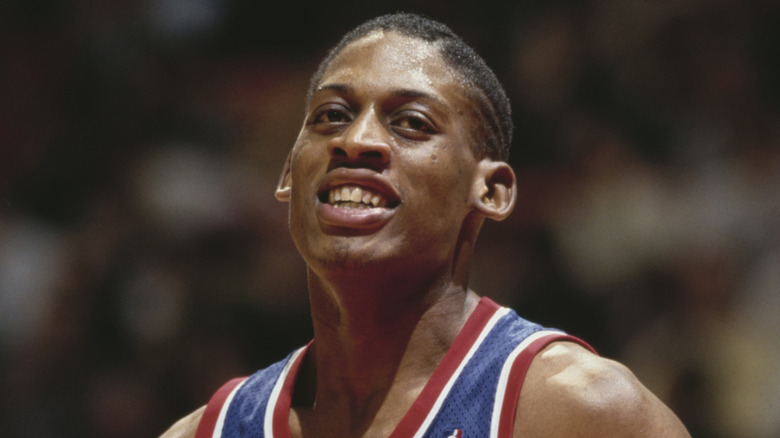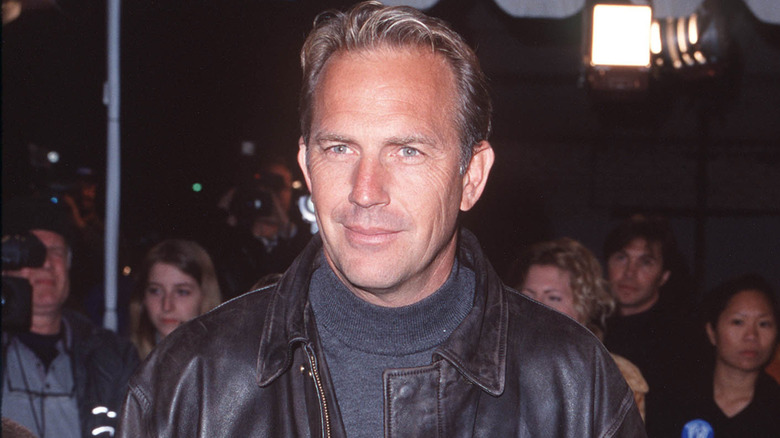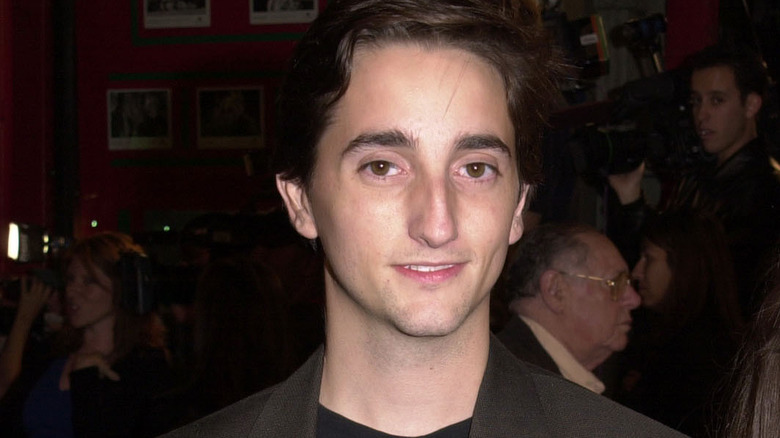'90s Stars Who Are Poorer Than You Realized
We may receive a commission on purchases made from links.
The 1990s could be very good for performers, be they an actor, musician, comedian, or athlete, provided they could break through into the mainstream. Pop culture at that point was still mostly a monoculture, meaning most everyone was subject to the same handful of TV channels, major-label music, venue-headlining comics, and superstars of just a few major sports leagues. Because so many eyeballs were on so few things, entertainment and being a public figure paid very well. A hit sitcom, smash-hit single, or significant fan following could garner a celebrity millions of dollars and leave them set for life.
Be that as it may, the 1990s are now a long way off, and the decade and its pop cultural contributions are fading into the past and the distant collective memory. Many of the era's most definitive stars have faded from view, and they aren't able to rake in what they once could. That, along with the tendency of humans to spend their money, means they're a lot less rich than they once were. Some are living under very modest means or even financial instability, owing to bad decisions or conscious choices. Here are some marquee stars of the 1990s who aren't living among the glitz and glamour like they once did.
Mel B
While they dealt with all the darker truths about being a pop star in the '90s, the Spice Girls became one of the biggest pop groups on the planet. Formed in the U.K. by a group of music industry veterans, the prefab five-member collective was a going concern from 1996 to 2000, and during that time it took nine of its 10 singles to No. 1 in the U.K. The best-known of those also fared well in the U.S., notably "Wannabe," "Say You'll Be There," and "2 Become 1." Each member of the group that sold 48 million records and starred in the hit film "Spice World" was distinguished by a different persona and nickname. Melanie Brown, for example, was better known as Mel B, or "Scary Spice" for her demeanor deemed to be intimidating and zany.
A Spice Girls reunion tour in 2019 generated millions for all involved parties, but Brown didn't benefit much, as her share largely went to settle her 2017 divorce from movie producer Stephen Belafonte. "I wasn't just emotionally and physically abused, there was all the financial abuse too. I didn't realize that I didn't have as much money as I thought I had," Brown told the BBC. The singer agreed to pay her ex-husband a $350,000 figure and $5,000 each month in child support payments. That left her with so little income that she moved into her mother's home.
Joey Lawrence
Every new decade brings with it another generation of potential teen idols: conventionally attractive young men with sitcom roles and record deals marketed to appeal to mostly the large and money-clutching demographic of teens and tweens. One of the most omnipresent teen idols of the early 1990s was Joey Lawrence. A well-known child star in the 1980s for his work on the sitcom "Gimme a Break," Lawrence was re-positioned as a teenage heartthrob in the 1990s with a showy, supporting role on the teen comedy "Blossom." He played the titular sensitive character's dim-witted but sweet older brother, Joey Russo, who'd stroll into the scene in ripped jeans and utter his catchphrase, "Whoa!" Lawrence starred on the network TV hit "Blossom" for six seasons, during which time he launched a moderately successful career as a pop star, scoring hits with "Nothin' My Love Can't Fix" and "Stay Forever."
The cable TV sitcom "Melissa and Joey" kept Lawrence afloat through 2015, but after it was canceled, his income fell by about 90%. After earning $58,000 in 2016, he and his then-spouse Chandie Yawn-Nelson declared bankruptcy a year later, citing $8,000 in the bank against $355,517 in debts. In 2018, Lawrence settled his bankruptcy claims, and some of his creditors weren't paid what they were owed, including the IRS, which received $31,000 of the $67,000 in back taxes the actor never paid.
Brett Butler
In the late 1980s and early 1990s, a stand-up comedian with a big audience and a unique voice could almost be guaranteed a network sitcom built around their persona. ABC made "Home Improvement" out of Tim Allen's macho-doofus schtick, and then followed it up with "Grace Under Fire." Pulling from star Brett Butler's life and routines, the show featured the comic as an acerbic Southern single mom with a dark past beset by violence and addiction. A top-five ratings hit in its first season, "Grace Under Fire" made Butler one of the highest-paid actors on TV, eventually netting the star $250,000 an episode.
Following Butler's publicly announced issues with alcoholism and a prescription painkiller addiction, the actor had a meltdown on the "Grace Under Fire" set in 1998, and production abruptly came to a permanent end. With the comic and Hollywood mutually unwilling to work with one another, Butler soon departed California and moved to a farm in Georgia, until she ran out of money and briefly lived in a shelter for the unhoused. Butler worked only sporadically in TV over the next two decades, supplementing her income with psychic readings. By 2021, Butler was again facing dire straits, and facing being unhoused again, she let a friend set up an online crowdfunding account to help the comic pay her bills.
If you or anyone you know needs help with addiction issues, help is available. Visit the Substance Abuse and Mental Health Services Administration website or contact SAMHSA's National Helpline at 1-800-662-HELP (4357).
Randy Quaid
Randy Quaid's career began with supporting parts in '70s classics like "Paper Moon" and "The Last Detail," for which he received an Academy Award nomination. He moved into stalwart character actor territory in the 1980s via his recurring role as Cousin Eddie in the "National Lampoon's Vacation" movies, then became a top-lined actor in the 1990s. Quaid helped headline hits like "Days of Thunder," "Kingpin," and "Independence Day."
In the 21st century, Quaid was more likely to make the news for his off-screen behavior than he was for his film work. In 2010, Quaid and his wife and manager Evi, went on the lam, claiming to be running for his life from a secret collective he called "The Hollywood Star Whackers" that ruthlessly assassinated celebrities. In addition to entertaining bizarre fan theories about celebrity deaths, that was around the same time that police in Santa Barbara, California, issued felony arrest warrants for the Quaids for crimes that included squatting in and vandalizing a guest house connected to a home they once owned. The Quaids absconded to Canada, and when attempting to re-enter the U.S. in Vermont in 2015, they were arrested and briefly detained. Quaid has since appeared in just two independent films, "All You Can Eat" and "The Christmas Letter," and he reportedly still owes creditors about $1 million.
Sinbad
Stand-up comedy was a big part of mainstream pop culture in the 1990s. As cable TV proliferated, channels like HBO, A&E, and Comedy Central filled their lineups with stand-up comedy shows and specials, and comics with a broad, family-friendly appeal could become big stars. Sinbad (real name: David Adkins) thus did very well for himself, both on the comedy circuit and in narrative projects. In addition to hit specials like "Brain Damaged," "Afros and Bellbottoms," and "Son a Preacher Man," he starred in well-liked '90s comedy movies such as "Jingle All the Way," "Good Burger," and "Houseguest," as well as his own sitcom, "The Sinbad Show."
Comedians can live seriously tragic lives, however. As of 2025, after a serious stroke in 2020 and a prolonged recovery period left him unable to work, Sinbad's net worth has been reported to be in the range of $100,000, far less than other long-beloved comedians of his era. Sinbad's financial problems first came to light in 2009, when he appeared near the top of the list of California's most egregious tax dodgers, owing the state government $2.2 million. By 2010, that number had fallen slightly to $2.1 million, but he owed the federal government $8.5 million in unpaid taxes. The comic immediately put his house on the market, seeking $3 million to pay down his debt.
Tori Spelling
Both of Tori Spelling's major 1990s roles were of a supporting variety, but they were vital to two of the biggest teen-centered TV shows of the decade. Spelling portrayed Violet Bickerstaff, a nerdy love interest for dweeb Screech on "Saved by the Bell," simultaneously with her work as chic rich kid Donna Martin on the primetime soap "Beverly Hills, 90210." Spelling stayed on the show for its entire 10-season run, from 1990 to 2000, claiming to have auditioned under a phony name to avoid charges of nepotism — the show was produced by her father, powerful TV industry figure Aaron Spelling, reportedly worth $600 million when he died in 2006.
By the time of her father's death, Spelling had settled into a career consisting of B-movies, low-budget made-for-TV films, and reality shows. Whatever wealth that Spelling accumulated in the entertainment industry, including the relatively modest $800,000 she'd inherited from her father, was virtually gone by 2023. After many years of reported financial problems, including a high-profile divorce from actor Dean McDermott, Spelling had to move out of the home she lived in with her five children due to a mold infestation and into an RV parked at a campground.
Dennis Rodman
Over the span of 14 seasons, Dennis Rodman amassed the stats and achievements that earned him a reputation as one of the best defensive players in NBA history. The two-time Defensive Player of the Year and hall-of-famer Rodman racked up nearly 12,000 rebounds and helped his teams win five championships.
Rodman was well compensated, earning around $27 million for his play, not counting the endorsement deals, movie appearance paychecks, and fees for the MTV reality show "The Rodman World Tour" he could command at the height of his fame as one of the most colorful, outspoken, and controversial athletes of the 1990s. Both before and after his NBA retirement in 2000, Rodman squandered a great deal of his earnings on living the high-profile celebrity lifestyle to which he had become accustomed. But the main reason why Dennis Rodman doesn't have the vast fortune he once did is because it was stolen.
Peggy Ann Fulford told Rodman that she had been educated in law and business at Harvard University, and then created tremendous personal wealth through trading on the stock market and making shrewd real estate deals. None of that was true, and instead of fulfilling a promise to Rodman to manage his finances by way of paying bills, filing taxes, and making investments, she helped herself to his accounts and stole millions from the NBA star and other professional athletes. She was sentenced to 10 years in prison in 2018, and was released in 2023.
Kevin Costner
A solid argument could be made that Kevin Costner is the quintessential movie star of the first half of the 1990s. He made one blockbuster after another, such as "Dances with Wolves," "Robin Hood: Prince of Thieves," "JFK," and "The Bodyguard." Not only did he act, but he directed, too, and his films were often in awards contention: He won the Best Director and Best Picture prizes at the Academy Awards for "Dances with Wolves."
After some mega-budgeted box office flops that rank among the biggest bombs of all time ("Waterworld," "The Postman") Costner slowly regained his Hollywood clout with the massively successful Western TV series "Yellowstone," which he departed in order to spend as much time as possible on his passion project, a planned four-movie Western saga called "Horizon: An American Saga." Costner starred in, co-wrote, and directed "Chapter 1" and "Chapter 2" of the planned franchise, filmed in tandem. And along with two other individuals, he also put up the money for the ambitious project.
The first movie didn't earn back its budget, bringing in just $38 million at the box office. That's roughly the same amount that Costner used from his personal fortune to pay for the movies. "Chapter 2" still hasn't been released as of May 2025, with production on the other two movies on hold, giving Costner little chance to recoup the substantial financial loss. It's been reported that a bankruptcy filing is a possibility for the former Hollywood bigshot.
Richard Ashcroft
A one-hit wonder can amass a fortune if their single successful single was a big enough smash. Theoretically, there could've and should've been millions of dollars in the bank accounts of Richard Ashcroft. As the creator and the frontman for the Verve from 1990 onward, it wasn't until 1997 that the band landed anything beyond a minor hit on the U.K. pop chart, and "Bitter Sweet Symphony" was a smash, reaching No. 2 in the U.K. and No. 12 in the U.S.
With the messed-up truth of the '90s music industry in effect, Ashcroft's best-known work didn't generate any money for the singer and lyricist for decades. "Bitter Sweet Symphony" was built around a cleared sample of an orchestral version of the Rolling Stones' "The Last Time" by the Andrew Oldham Orchestra. Then Allen Klein, head of ABKCO Records and the Stones' former manager and copyright controller, sued Ashcroft and the Verve for plagiarism, claiming that they used far more of the AOO piece than was necessary. Ashcroft agreed to give "The Last Time" songwriters Mick Jagger and Keith Richards songwriter credits on "Bitter Sweet Symphony," and thus all royalties to ABKCO Records. Andrew Oldham then sued for $1.7 million in royalties he believed were owed. Ashcroft got nothing from "Bitter Sweet Symphony" until 2019, when Jagger and Richards decided to gift their royalties to the Verve's singer.
Erykah Badu
The late '90s neo-soul movement — which recalled the rich and engrossing R&B sounds of the '70s — got a major boost with the 1997 release of Erykah Badu's first LP, "Baduizm." Badu's personal, soulful, psychedelic, and funny compositions proved immediately popular, and songs like "On and On," "Next Lifetime," and "Tyrone" all reached No. 1 on the R&B chart. "Baduizm" sold 3 million copies, won the Grammy Award for Best R&B Album, and fueled Badu's nod for Best New Artist, a category which can curse winners into vanishing.
Badu continued to make and release top-selling albums, but she hasn't released a record since 2010's "New Amerykah, Pt. 2: Return of the Ankh." While she still will occasionally put out a song or a feature, Badu has focused her professional time and attention on working as a doula, a natural birth coach trained in traditional medicinal methods who assists new mothers during and after labor. It's a practice that Badu first began in 2001, just for friends and loved ones, before becoming an officially certified doula and midwife.
Charlie Korsmo
When filmmakers of the early 1990s needed a child actor who could handle serious and straightforward roles without coming across as treacly or corny, they often sought out the services of Charlie Korsmo. At the beginning of the decade, it looked as if Korsmo would dominate the new generation of rising Hollywood stars. He held his own against A-list stars and screen legends in one movie after another: Korsmo starred opposite Jessica Lange in "Men Don't Leave," Warren Beatty in "Dick Tracy," Robin Williams in "Hook," and Richard Dreyfuss in "What About Bob?" All those films were released in 1990 and 1991, and after a seven-year break, Korsmo returned to play nerd-turned-party animal William Lichter in "Can't Hardly Wait." That hit 1998 movie would mark Korsmo's last acting work of any kind for 20 years. All told, he starred in films that made $226 million at the box office.
Korsmo left a potentially lucrative career in entertainment to be an attorney in sectors where the money doesn't flow quite as rapidly. After obtaining a law degree at Yale, in the early 2000s, Korsmo served on the legal staffs of the Environmental Protection Agency and the Homeland Security Committee. After clerking for a Second Circuit appellate judge and some time in the private sector, Korsmo joined Case Western University, where he's the Morris G. Shanker Professor of Law.
